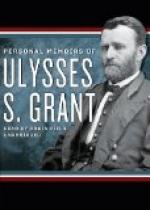I do not question the personal courage of General Johnston, or his ability. But he did not win the distinction predicted for him by many of his friends. He did prove that as a general he was over-estimated.
General Beauregard was next in rank to Johnston and succeeded to the command, which he retained to the close of the battle and during the subsequent retreat on Corinth, as well as in the siege of that place. His tactics have been severely criticised by Confederate writers, but I do not believe his fallen chief could have done any better under the circumstances. Some of these critics claim that Shiloh was won when Johnston fell, and that if he had not fallen the army under me would have been annihilated or captured. IFS defeated the Confederates at Shiloh. There is little doubt that we would have been disgracefully beaten if all the shells and bullets fired by us had passed harmlessly over the enemy and if all of theirs had taken effect. Commanding generals are liable to be killed during engagements; and the fact that when he was shot Johnston was leading a brigade to induce it to make a charge which had been repeatedly ordered, is evidence that there was neither the universal demoralization on our side nor the unbounded confidence on theirs which has been claimed. There was, in fact, no hour during the day when I doubted the eventual defeat of the enemy, although I was disappointed that reinforcements so near at hand did not arrive at an earlier hour.
The description of the battle of Shiloh given by Colonel Wm. Preston Johnston is very graphic and well told. The reader will imagine that he can see each blow struck, a demoralized and broken mob of Union soldiers, each blow sending the enemy more demoralized than ever towards the Tennessee River, which was a little more than two miles away at the beginning of the onset. If the reader does not stop to inquire why, with such Confederate success for more than twelve hours of hard fighting, the National troops were not all killed, captured or driven into the river, he will regard the pen picture as perfect. But I witnessed the fight from the National side from eight o’clock in the morning until night closed the contest. I see but little in the description that I can recognize. The Confederate troops fought well and deserve commendation enough for their bravery and endurance on the 6th of April, without detracting from their antagonists or claiming anything more than their just dues.




